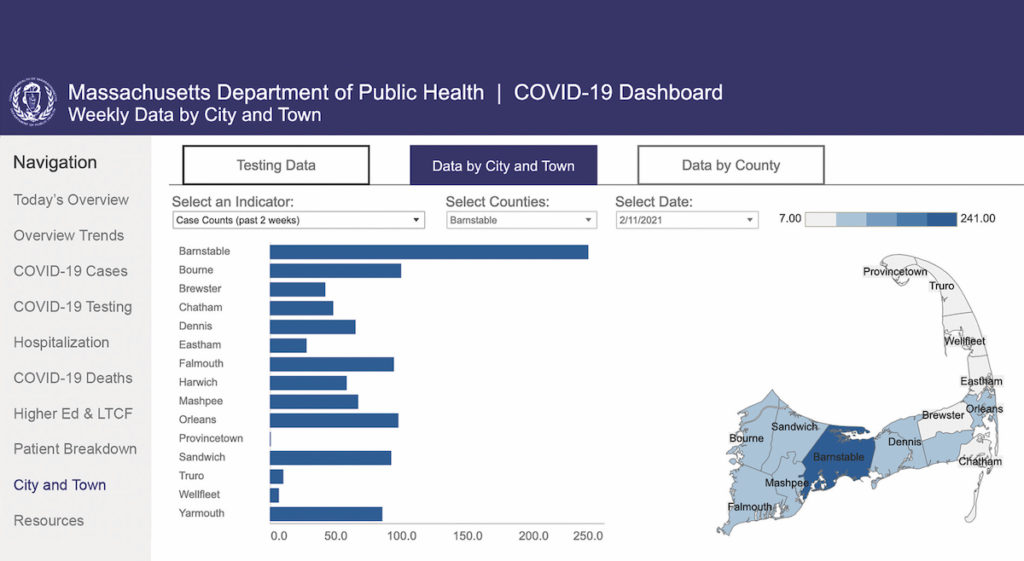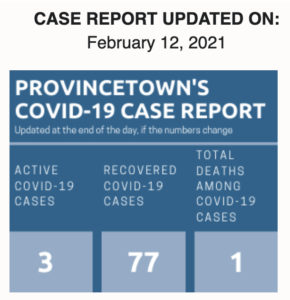
PROVINCETOWN — The Covid testing program at Outer Cape Health Services (OCHS), which relies on rapid BinaxNOW tests provided by the state, has been a local success story. The tests are free, appointments are available, and the wait time for results is often less than two hours.
“I think it’s tremendously valuable,” said state Sen. Julian Cyr, “particularly since 60 percent of the people testing positive have been asymptomatic — people who wouldn’t have known they were carriers.”
But because rapid tests (also called antigen tests) once had a poor reputation for accuracy — mostly for false negatives — the state classifies their positive results as “probable cases.” Only molecular PCR tests, which cultivate viral RNA through dozens of growth cycles in a laboratory, yield “confirmed cases.”
Most state metrics include only “confirmed cases,” including the Dept. of Public Health’s published reports on cases in each town.

That means the thousands of rapid tests that have taken place at OCHS since Dec. 23, and the dozens of positive cases they’ve uncovered, aren’t included in the state’s town-by-town data report. And for towns that rely mostly on rapid tests, state reports of testing rates, percent positivity, total infections, and recent cases are all going to be inaccurate.
The DPH reports data this way because the state overwhelmingly relies on PCR tests. Since the pandemic began, Massachusetts has tallied 15 million PCR tests, and only 530,000 rapid tests. On one recent day, Feb. 11, there were 118,372 PCR tests and only 2,841 rapid tests statewide, the latter accounting for just 2 percent of the total. Rapid tests are just a rounding error for Covid data in most parts of the state.
But on the Outer Cape, they’re the principal testing resource, so their exclusion distorts the count significantly. Town and county leaders are taking a variety of approaches to the problem.
Positively Unreported
Provincetown’s health dept. reports “active cases” and “recovered cases” on the town website. Active cases include both those discovered by PCR and by rapid testing, according to Health Director Morgan Clark.
Provincetown’s total of active and recovered cases reported on its website was larger than the state’s case number even before the advent of rapid testing, because Provincetown has taken a more expansive view of residency.
“The town reports any confirmed positive case where a person resides in Provincetown during their isolation and treatment,” said Clark in November. Anyone that the health dept. is managing, regardless of permanent residency, is included in the “blue box” tally on the town’s website.
Truro takes a similar approach, but posts only active cases on its website, not recovered cases. This number includes confirmed and probable cases, Health Agent Emily Beebe said. Truro doesn’t maintain a “recovered” category because the state can reallocate cases as people’s residencies change, she added.
Indeed, the state’s weekly Covid report says “case counts for specific cities and towns change throughout the day as data cleaning occurs and new demographic information is obtained.”
In January, Eastham started reporting totals of confirmed and probable cases. “We have recently started reporting probable cases due to the increase in availability of the antigen tests,” the town’s website says. “Our objective is to inform the public,” said Eastham Health Director Jane Crowley.
Wellfleet Health Agent Hillary Greenberg-Lemos said she is happy to report Wellfleet’s case counts to anyone who calls or emails for the information, and she reports them at select board meetings as well. She gets the numbers directly from the state’s contact tracing system, MAVEN, and includes both confirmed and probable cases in her tallies.
Greenberg-Lemos said there were 10 new cases in the two weeks ending Feb. 2, and another five new cases in the two weeks ending Feb. 16.
Having multiple sets of numbers is confusing. At press time, Provincetown’s all-time case total was 81 on its website, while the state says 60. Eastham reports an all-time total of 132, while the state says 105. Provincetown’s health dept. has released multiple statements to the public explaining how the numbers work.
The Independent asked the county to produce a town-by-town report that includes both PCR and rapid test results, but it declined, because, said Sonja Sheasley, communications manager for Barnstable County, “All hands are dealing with a surge in confirmed and probable cases, and with vaccine planning and implementation.”
The case numbers live inside MAVEN, and only a few people have access to that system. Until Cape Cod’s vaccine crisis has abated, the case reporting situation is likely to remain tangled.
